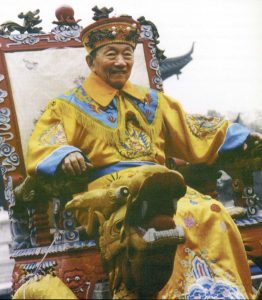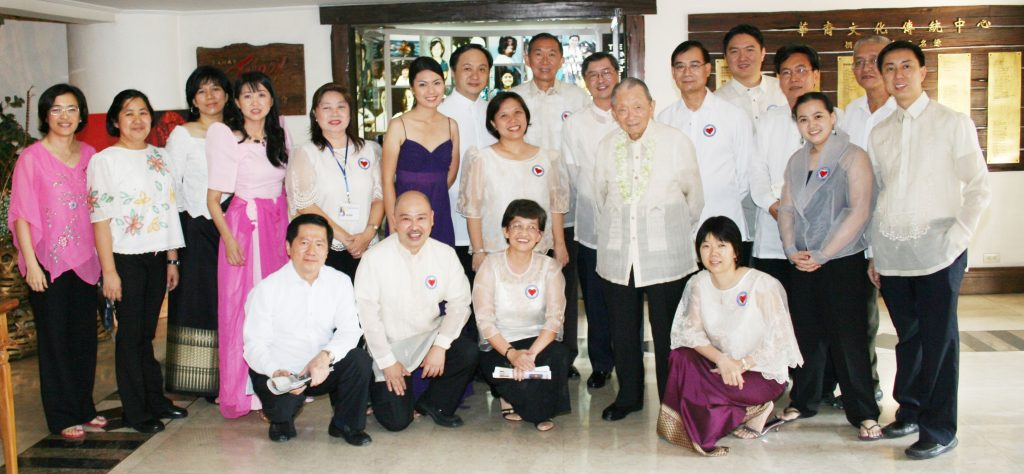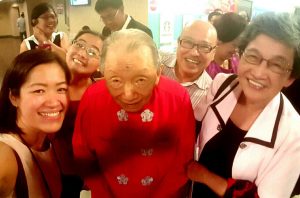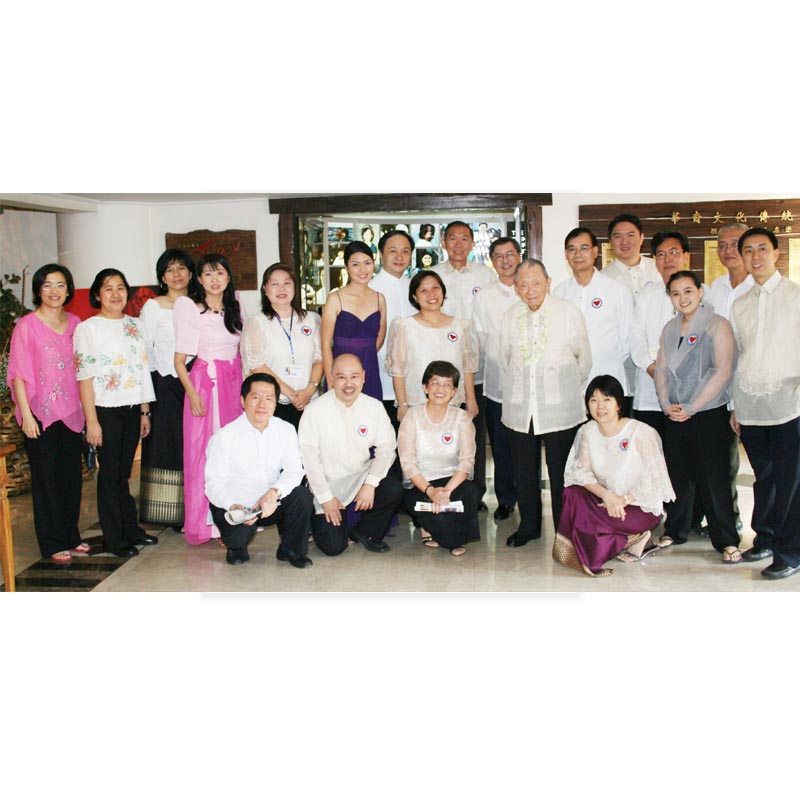
His death is a big loss to the world, but most especially to Philippine society for which he gave so much of himself selflessly and unstintingly. Washington Sycip (薛華誠), a lifetime trustee of the Kaisa Heritage Foundation, was a benefactor, a mentor, a critic for the Kaisa Heritage Center which houses the Bahay Tsinoy – Museum of the Chinese in Philippine Life. But far more importantly, he was an inspiration whose encouragement, understanding and kind words prodded me to keep going when it got really tough and I despaired at making a dent in the matters that required attention.
I regret I never told him how much I admired him and how, in particular, his lifetime advocacies in raising the status of the Philippines in the international community had made so much difference in how the world looked at us. Mutual friends that I encounter, some of them people whom Uncle Wash had introduced me to, speak highly of him and his lifetime passion to see the Philippines move ahead.
I got to know his younger brother, the lawyer Alexander SyCip first. Atty. Alex tasked a young intern at his office who had just passed the Bar exams to help Pagkakaisa Sa Pag-unlad prepare its constitution and by-laws and register the organization with the Securities and Exchange Commission. That young intern was Senate President Franklin Drilon, who fondly remembered how our organization started.
Today, the successor of Pagkakaisa, Kaisa Para Sa Kaunlaran, just celebrated its 30th anniversary. From the legal advice of Atty. Alex, we shifted to the sound financial advice of Washington SyCip.
Let me share some vignettes of my encounters with Uncle Wash, as I fondly called him.
He was among the rare business persons in the Tsinoy community who understood the importance of culture and heritage. I’ve often lamented how the merchant mentality and practicality of business people in the Tsinoy community had blinded them to the importance of Kaisa Heritage Center in its preserving and promoting the historical and cultural legacy of the Chinese in all aspects of Philippine life.
We’ve been fortunate that there were many who understood this work and gave their unstinted support. But Kaisa works so hard within a very limited budget that I’ve often wished that Tsinoy organizations would cut down expenses in their many social activities like inductions and help fund our projects instead.
Uncle Wash understood our need and hosted a dinner for us with the taipans: Henry Sy, Alfonso Yuchengco, John Gokongwei and Lucio Tan. That started the endowment fund for the Center which was opened to the public in 1999.
But we were unable to raise the P150 million target fund we so badly needed – we had planned to use only the interest in maintaining the Center and funding our projects – that we often had to ask permission to dip into the endowment fund. During board meetings, other trustees would be reluctant to agree because the fund was supposed to be left intact.
The board members, however, took their cue from Uncle Wash who said that since we had no choice, we should be allowed to touch the endowment fund and hope that we can raise more funds to replace it and work towards meeting our goal.
As Uncle Wash understood the importance of culture and heritage, he was invited to be one of the founding governors of the Chinese Heritage Center in Singapore in 1995. He sat on the board with other eminent Chinese Southeast Asians such as Salim (Lim Siow Liong) of Indonesia, Li Ka Shing of Hong Kong, Jeffrey Koo of Taiwan and Chatri Sophonpanich of Thailand.
However, he was the only one who, instead of sending representatives, attended the annual governors’ meetings personally. He did this for 10 years and in 2005, he requested me to take over his position. I told him I personally spend for all my expenses in attending conferences abroad and I cannot afford to add one more just to attend the CHC meetings in Singapore.
He told me he would take care of it. Upon his request, I visited him at SGV at 7:30 a.m. He had a check for P500,000 ready, with a letter specifying that the amount was for Teresita Ang See for attending conferences and CHC meetings.
Later on, I learned that CHC always reimbursed the governors their expenses for attending meetings, but since they were such big names, they never asked for reimbursement. They reassured me that CHC will pay for my ticket and lodging for meetings.
The P500,000 check went into the endowment fund because our Heritage Center’s charter provides that no officers should benefit from the organization’s funds. Though I did not benefit from Uncle Wash’s conference-attendance fund, I was really touched by that gesture and by the thought that he personally cared for my welfare.
When Uncle Wash attended our board meetings, he could easily spot mistakes and discrepancies in our financial reports. Even at 80, his eyes were still very sharp. We requested his help in having SGV audit our finances and he set up a meeting for us with his partners.

Since 2006, SGV has been auditing KHC’s finances and systems. We are truly grateful because it meant a lot in showing our benefactors that we are accountable and transparent in our finances.
Because of my high respect and admiration for him, Uncle Wash and former University of the Philippines president Dr. Francisco Nemenzo were the two people I invited to talk at the launching of my book, Tsinoy: The story of the Chinese in Philippine life, at the Kaisa Heritage Center in 2005.
In one of the many conversations I had with him, I relayed my wish that I could discard the anti-crime advocate hat that I wear because it eats up so much of my time. He asked me if I were given a choice, what I wanted to do.
I told him I want to help farmers, fruit and vegetable growers, especially. I recounted to him that the most memorable sights I saw when I lived in Taiwan for two years (when my late husband was doing anthropology field work) were the vegetable farms and how they could grow four kinds of vegetables at the same time, with varying maturity periods.
We went on to discuss how blessed the Philippines is in having such fertile soil and abundant water compared to Taiwan and southern China, but how we have always lacked good leadership. I relayed my frustration that there didn’t seem to be any reason why we had to import rice but government priorities supported converting the rice lands into housing subdivisions.
He discussed his favorite topic: education. He said since I was not an agriculturist, I cannot teach the farmers, but helping them and their children get much-needed education would make a big difference.
He talked about his experience in public schools and about his excellent teachers and classmates. He also recounted the difficult adjustments from being raised in Shanghai to learning to communicate in English and Filipino in a public school.
He told me why he and his brothers did not work for China Bank or any of his father’s companies. In the same way, he also did not want his children to work at SGV.
“If my children do well,” his father had said, “people will claim that it is because they are the Chairman’s children. If they do not do well, people will judge them even more harshly; that they must be really stupid not to do well despite being the Chairman’s children,” he earnestly told me.
 There were many conversations like that, especially about the leaders of our country. He told me how he gave friendly reminders to the then presidents of the country (Cory C. Aquino, Fidel V. Ramos, Joseph Estrada, Gloria M. Arroyo and Benigno Aquino) about what was going wrong and what must be done.
There were many conversations like that, especially about the leaders of our country. He told me how he gave friendly reminders to the then presidents of the country (Cory C. Aquino, Fidel V. Ramos, Joseph Estrada, Gloria M. Arroyo and Benigno Aquino) about what was going wrong and what must be done.
He felt bad about the PIATCO (Philippine International Air Terminals Co.) fiasco and later the NBN-ZTE scandal. He told me he couldn’t understand how ZTE, which had long been doing successful business in the Philippines, could mess up such a good project by conniving with wrong politicians known for shady deals.
I regret that I have not had a chance to talk to him about the present administration and what he personally thought about President Rodrigo Duterte.
His life reflects the history of modern Philippines and the Tsinoys in Philippine life. He had encountered all the presidents of the Philippine Republic and had been with Philippine society through progress, fortune and government policies that worked, to disasters, calamities and policies that failed. His passion was to see our country raise its head up proudly in the community of nations. He passed on quietly enroute to New York, while still working.
His was a life truly well lived and fulfilled. I pray that his dreams for our country will be realized one day in the future, if not soon.
